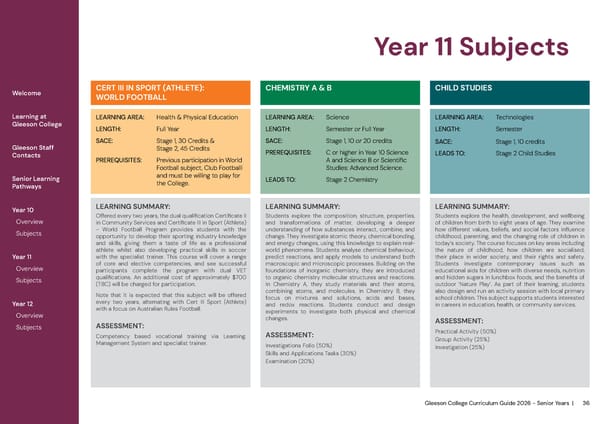Gleeson College Curriculum Guide 2026 - Senior Years | 36 Year 11 Subjects Welcome Learning at Gleeson College Gleeson Staff Contacts Senior Learning Pathways Year 10 Overview Subjects Year 11 Overview Subjects Year 12 Overview Subjects LEARNING SUMMARY: Offered every two years, the dual qualification Certificate II in Community Services and Certificate III in Sport (Athlete) - World Football Program provides students with the opportunity to develop their sporting industry knowledge and skills, giving them a taste of life as a professional athlete whilst also developing practical skills in soccer with the specialist trainer. This course will cover a range of core and elective competencies, and see successful participants complete the program with dual VET qualifications. An additional cost of approximately $700 (TBC) will be charged for participation. Note that it is expected that this subject will be offered every two years, alternating with Cert III Sport (Athlete) with a focus on Australian Rules Football. ASSESSMENT: Competency based vocational training via Learning Management System and specialist trainer. CERT III IN SPORT (ATHLETE): WORLD FOOTBALL LEARNING AREA: Health & Physical Education LENGTH: Full Year SACE: Stage 1, 30 Credits & Stage 2, 45 Credits PREREQUISITES: Previous participation in World Football subject, Club Footballl and must be willing to play for the College. CHEMISTRY A & B LEARNING AREA: Science LENGTH: Semester or Full Year SACE: Stage 1, 10 or 20 credits PREREQUISITES: C or higher in Year 10 Science A and Science B or Scientific Studies: Advanced Science. LEADS TO: Stage 2 Chemistry LEARNING SUMMARY: Students explore the composition, structure, properties, and transformations of matter, developing a deeper understanding of how substances interact, combine, and change. They investigate atomic theory, chemical bonding, and energy changes, using this knowledge to explain real- world phenomena. Students analyse chemical behaviour, predict reactions, and apply models to understand both macroscopic and microscopic processes. Building on the foundations of inorganic chemistry, they are introduced to organic chemistry molecular structures and reactions. In Chemistry A, they study materials and their atoms, combining atoms, and molecules. In Chemistry B, they focus on mixtures and solutions, acids and bases, and redox reactions. Students conduct and design experiments to investigate both physical and chemical changes. ASSESSMENT: Investigations Folio (50%) Skills and Applications Tasks (30%) Examination (20%) CHILD STUDIES LEARNING AREA: Technologies LENGTH: Semester SACE: Stage 1, 10 credits LEADS TO: Stage 2 Child Studies LEARNING SUMMARY: Students explore the health, development, and wellbeing of children from birth to eight years of age. They examine how different values, beliefs, and social factors influence childhood, parenting, and the changing role of children in today’s society. The course focuses on key areas including the nature of childhood, how children are socialised, their place in wider society, and their rights and safety. Students investigate contemporary issues such as educational aids for children with diverse needs, nutrition and hidden sugars in lunchbox foods, and the benefits of outdoor ‘Nature Play’. As part of their learning, students also design and run an activity session with local primary school children. This subject supports students interested in careers in education, health, or community services. ASSESSMENT: Practical Activity (50%) Group Activity (25%) Investigation (25%)
 2026 Gleeson College Senior Years Curriculum Guide 2026 Page 35 Page 37
2026 Gleeson College Senior Years Curriculum Guide 2026 Page 35 Page 37